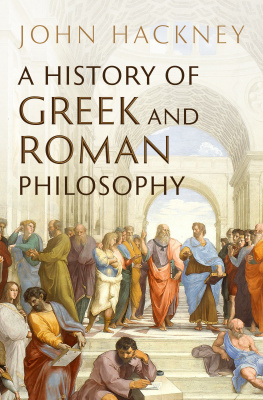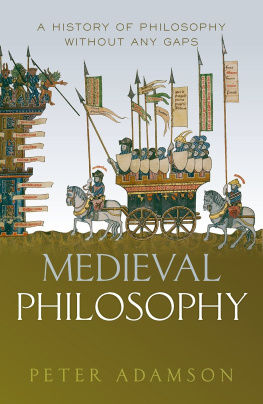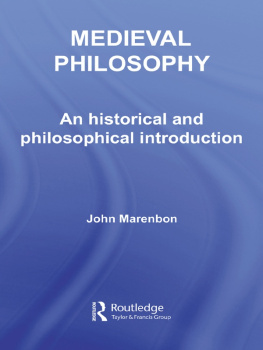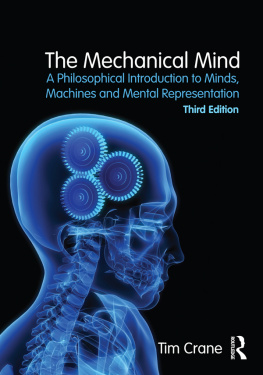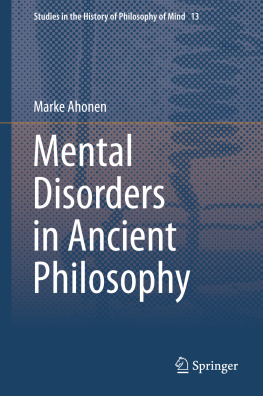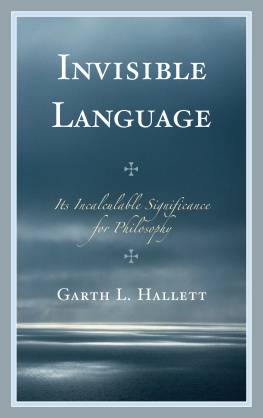MENTAL LANGUAGE
MEDIEVAL PHILOSOPHY
Texts and Studies
Gyula Klima, Fordham University
series editor
Richard Cross
Brian Davies
Peter King
Brian Leftow
John Marenbon
Robert Pasnau
Giorgio Pini
Richard Taylor
Jack Zupko
editorial board
MENTAL LANGUAGE
From Plato to William of Ockham
CLAUDE PANACCIO
Translated by Joshua P. Hochschild and Meredith K. Ziebart
FORDHAM UNIVERSITY PRESS
New York 2017
Copyright 2017 Fordham University Press
All rights reserved. No part of this publication may be reproduced, stored in a retrieval system, or transmitted in any form or by any meanselectronic, mechanical, photocopy, recording, or any otherexcept for brief quotations in printed reviews, without the prior permission of the publisher.
This book was first published in French as Le discours intrieur: De Platon Guillaume dOckham, by Claude Panaccio ditions du Seuil, 1999.
Fordham University Press has no responsibility for the persistence or accuracy of URLs for external or third-party Internet websites referred to in this publication and does not guarantee that any content on such websites is, or will remain, accurate or appropriate.
Fordham University Press also publishes its books in a variety of electronic formats. Some content that appears in print may not be available in electronic books.
Visit us online at www.fordhampress.com.
Library of Congress Cataloging-in-Publication Data
Names: Panaccio, Claude, 1946 author. | Hochschild, Joshua P., 1972 translator. | Ziebart, Meredith K., translator.
Title: Mental language: from Plato to William of Ockham / Claude Panaccio; translated by Joshua P. Hochschild and Meredith K. Ziebart.
Other titles: Discours intrieur. English | Medieval philosophy.
Description: New York: Fordham University Press, 2017. | Series: Medieval philosophy: texts and studies
Identifiers: LCCN 2016013974 | ISBN 9780823272600 (cloth: alk. paper)
Subjects: LCSH: Thought and thinkingHistory. | Knowledge, Theory ofHistory. | Concepts. | Logic. | Language and logic.
Classification: LCC B105.T54 P3513 2017 | DDC 121dc23
LC record available at https://lccn.loc.gov/2016013974
Printed in the United States of America
19 18 17 5 4 3 2 1
First edition
CONTENTS
More than a decade after its original publication, Claude Panaccios book is more actual than ever. This claim is amply justified by the reasons carefully listed by the author in the new Postscript to the English translationnamely, recent developments both in the historiography of and theoretical reflection on the idea of a mental language. Indeed, most of the results of these new developments have been published in English, while until now there has been no comparable study available in English providing a systematic survey of the historical evolution of the idea. It is therefore with great pleasure that I present the long overdue and updated translation of a real gap-filler in the English literature on the subject.
Gyula Klima
Series editor
This book is the result of a project originally much more narrowly circumscribed: it aimed to trace the theoretical discussions of the period (from approximately 1250 to 1320) that led to William of Ockhams theory of mental language (oratio mentalis). At the time, I was guided by two motivations that I feel it is appropriate to describe here, as they remained decisive throughout my research.
On the one hand, I asked myself whether these scholastic debates, seemingly so different from our own and quite often conducted in a theological context, nonetheless had some relation to the problem of the language of thought that is treated in contemporary cognitive science. The very possibility of an intellectual conversation with authors as distant from us as the medievals was called into question in the 1960s, thanks to the spectacular success of such notions as rupture, incommensurability, and paradigm shift. But perhaps the conclusions and hypotheses of Thomas Kuhn and Michel Foucault have been too readily accepted. The question, it seems to me, should be addressed in terms of detailed analyses of particular cases; indeed, the topic of mental language would especially seem to demand such treatment.
On the other hand, recent work by historians of ideasin particular, William Courtenay, Zenon Kaluza, and Katherine Tachauhas forcefully demonstrated the need to reevaluate the place of William of Ockham in the history of later medieval philosophy, as well as the impact of his work on his immediate contemporaries and successors. Tachau, for example, maintained (in an important work that appeared in 1988, Vision and Certitude in the Age of Ockham) that the Ockhamist theory of knowledge was quite poorly received in the universities of the day and did not lead to the establishment of a philosophical school. However, Tachaus inquiry was restricted to select themesnamely, those surrounding intuitive cognition (notitia intuitiva) and the mental image (the species). It seemed to me that a similar study of the idea of mental language, central for the venerabilis inceptor, could perhaps act as a counterweight and in any case would provide a useful completion of the portrait. My hypothesis wasand still isthat William of Ockham accomplished, in the years 131525, a major and highly influential theoretical revolution, precisely through the development of the concept of oratio mentalis.
It quickly became clear, however, that I would need to move beyond the limited chronological frame to which I had initially confined myself in order to allow a detailed reexamination of the topics Greek, Roman, patristic, and Arab sources, as well as of the entire medieval development of the theme since Anselm of Canterbury in the eleventh century. For not only did the texts of Aristotle, Augustine, Boethius, and John Damascene (as well as those of Anselm), on this topic and others, influence later reflection, but further, no recent work in the history of classical notions of logos endiathetos and verbum cordis provided an overview that could supply adequate background for my projected inquiry. It was thus necessary for me to venturewith fear and trembling!into territory with which I was initially less familiar. With that, the feasibility of the enterprise became much less obvious. I believed that I ought to persist, despite the obstacles, only because I was convinced, on the basis of my readings and numerous discussions with colleagues, that it was necessary to evaluate, in a synthetic manner, the large question of interior discourse in ancient and medieval thought. Inevitably, errors will have escaped my attention. I only hope that the completed work will appear, as I believe, sufficiently fruitful that others might be willing to supplement or correct it where needed.
In any case, the project would never have succeeded without the continuing support of the Social Sciences and Humanities Research Council of Canada, the Quebec Fund for the Formation of Scholars and the Advancement of Research (FCAR), and the Institutional Research Fund of the University of Quebec in Trois-Rivires. My recognition of these organizations is all the greater for their generous help in permitting many assistants to accompany and stimulate my research, some over many months, others for several years. Here I wish to thank warmly all those students who were indispensable to the work of the bibliography, documentation, and analysis: Ivan Bendwell, Luc Bergeron, Richard Caron, Mario Charland, Guy Hamelin, Marcelo Lannes, Sylvie Larame, Rene Lavergne, Maxime Lebeuf, Andr Leclerc, Lyne Neault, Patricia Nourry, and Gilles Ouimet.
Next page

